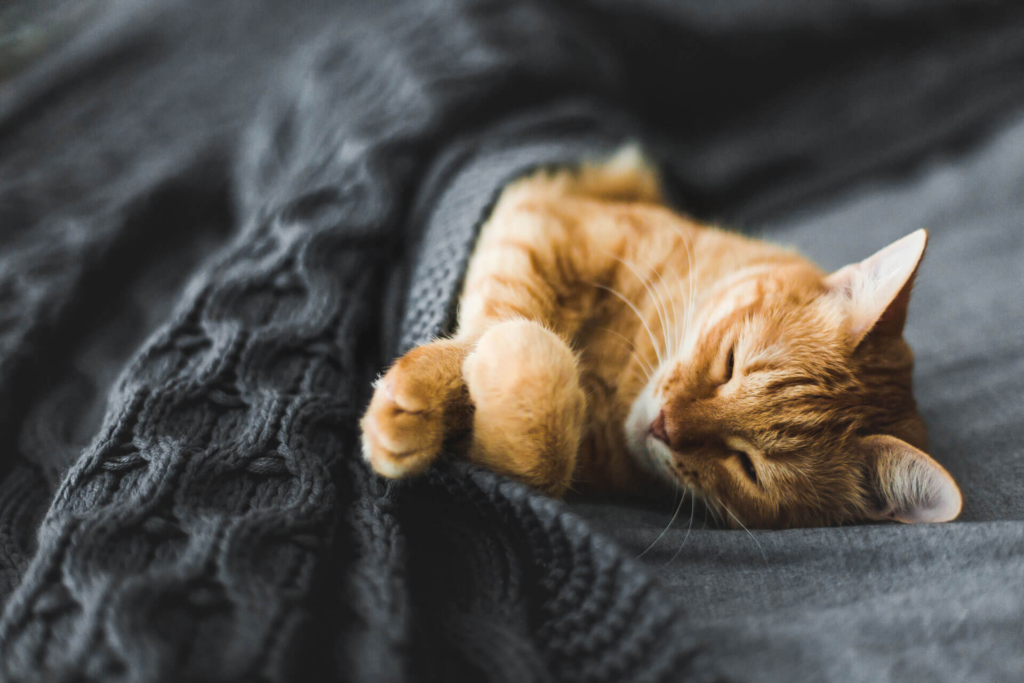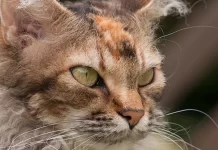Last Updated on August 25, 2023 by Fumipets
Unveiling the Mystery: Why Do Cats Sleep So Much?
Cats are renowned for their love of sleep, spending a significant portion of their lives in a state of slumber. While it might seem excessive to us, their sleeping habits are deeply ingrained in their nature. Let’s explore the fascinating reasons behind why cats sleep so much in this summary.
Cats Sleep So Much
Your computer, printer, head, bed, sofa, kitchen counter, and curtain are all places where you could find these things. What do all of these locations share? The answer is your cat has slept there if you are a cat owner. Cats like to relax in areas like those and a lot more.
Have you ever questioned if all this napping is typical? Cats sleep or relax for 15 to 20 hours each day. Therefore, it is likely unimportant how your cat is obtaining his ZZZs. Here are seven possible explanations for your cat’s sleeping habits and information on how to determine if they are typical.
1. Your Cat May Be Nocturnal
Your cat’s propensity for napping so much during the day may be related to his propensity to stay up at night chasing fictitious mice. Crepuscular or nocturnal ancient cats were active at night and in the morning and evening. The majority of domestic cats follow routines similar to ours, resting for most of the night and spending time with us during the day. However, it’s possible that your cat is adhering to his primal tendencies and spending the day dozing off and behaving as a predator at night.
2. Your Cat Might Be Conserving Energy
Cats are both prey and predators. Like many predators, they store energy by sleeping or resting so that they have more energy to use while hunting in sporadic spurts. This cycle of hunting and sleeping is not alarming.
3. Maybe He Isn’t Sleeping When You Think He Is
Not every nap is a deep one. Cats sometimes just press the stop button and take a little break—a “cat nap,” if you will. Your cat’s ears or tail may sometimes move when his eyes are closed fully or even just partly. He is probably not sleeping at all, but rather listening to his surroundings and getting ready to take action.

4. Your Cat Might Be Bored
Animals sometimes sleep more when there is nothing to do. There are several methods to make your cat’s life more interesting and reduce boredom. You may, for instance, construct a catio for your cat, a secure outdoor area, or some climbing shelves. Giving your cat enrichment toys is a simpler option if your building abilities aren’t up to the challenge. Three different sorts of toys should be provided daily for your new kitten or older cat. Observe the toys he enjoys using before making a new style or color buy of those same toys. You can prevent boredom by learning what he likes and then buying that kind of toy.
5. Your Cat Might Be Stressed
Cats employ hiding and reduced activity as coping mechanisms when they are terrified or agitated. If your cat hides from the family, only interacts with one person, runs away during storms, or exhibits other signs of worry, he may be under a lot of stress. His coping mechanism can be to sleep more. Consult your cat’s primary care veterinarian for information on the effects of stress. Your referral to a board-certified veterinary behaviorist may come from her. In the book Decoding your Cat, you can read more about cat stress and discover ways to lessen it.
6. Your Cat Might be Sick or Uncomfortable
When they are ill or feeling under the weather, cats hide and become less active. Your cat could be in discomfort or uncomfortable if he spends most of this time on the cat tree or beneath the bed.
Your cat may not be able to move about very much and may choose to rest if he is overweight since it hurts to move. Cat obesity is a severe issue that may cause discomfort while moving or endocrine problems that need lifetime therapy. Make an appointment with your primary care veterinarian to have your cat’s general health examined if you can’t readily feel his ribs.

7. Maybe You Need to Sleep More and Your Cat’s Sleep Patterns are Normal
Cats and humans alike may refuel by sleeping. A healthy sleep schedule is crucial for immunological function and general well-being. Unlike humans, cats seem to understand the intrinsic value of sleep and make the time to rest. It’s possible that you’re getting more sleep than your cat is!
Your cat should sleep and relax for up to 20 hours per day. Just go along with it if he is healthy, happy, and in good spirits. You could also benefit from a snooze!
Questions & Answers
1. Why do cats sleep so much?
Cats are natural predators, and their ancestors were nocturnal hunters. While domestic cats may not need to hunt for their meals, their instincts to conserve energy and remain alert during their active periods still influence their sleep patterns.
2. How many hours a day do cats sleep?
Cats can sleep anywhere from 12 to 16 hours a day on average. However, some cats, particularly kittens and older cats, may sleep even more.
3. Do cats have different sleep cycles than humans?
Yes, cats have different sleep cycles compared to humans. They experience multiple short periods of deep sleep followed by brief periods of wakefulness. This cycle allows them to be ready for action at a moment’s notice.
4. Is it normal for cats to sleep during the day and be active at night?
Yes, it’s normal for cats to be crepuscular, meaning they are most active during the dawn and dusk. This behavior is linked to their hunting instincts and aligns with their ancestors’ hunting patterns.
5. How can I ensure my cat’s sleep is restful?
Create a comfortable and quiet sleeping environment for your cat. Provide cozy beds, blankets, and elevated spots where they can feel safe and secure. Regular play and mental stimulation during their active periods can also help them sleep more soundly.
Decoding Cats’ Slumber: A Natural Behavior
Cats’ propensity for sleep is deeply rooted in their evolutionary history and hunting instincts. Whether they’re dozing in sunlit spots or curled up in cozy corners, cats’ sleep serves vital functions in preserving energy and maintaining their readiness for action. By understanding and respecting their natural sleep patterns, we can ensure our feline friends enjoy the restful slumber they need to stay happy and healthy.


















